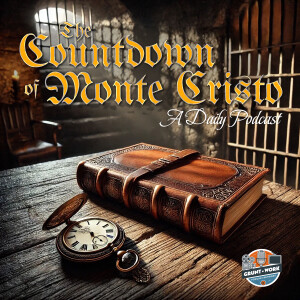
Thursday Apr 03, 2025
The Name That Must Be Forgotten (The Count of Monte Cristo, Chapter 6)
📚 Summary:
As tensions simmer at the aristocratic wedding feast, Villefort finds himself confronted with the unavoidable weight of his family history. The Marquise de Saint-Méran reminds him that while both their families suffered during the Reign of Terror, they did so for opposing reasons—hers for loyalty to the Bourbons, his for revolution. Villefort, eager to distance himself from his father, the Girondin-turned-Bonapartist Noirtier, insists that he has severed all ties to his past, even symbolically abandoning his family name. But despite his efforts, his origins cannot be erased so easily, and the shadow of Noirtier lingers. Meanwhile, Renée, Villefort’s fiancée, attempts to ease tensions, representing the younger generation’s wish to move beyond these political divisions.
✨ What Happens:
•Villefort admits his father, Noirtier, was a Girondin but insists he did not support the king’s execution.
•The Marquise de Saint-Méran acknowledges this but reminds him that their families fought for opposite causes.
•Renée tries to steer the conversation away from political conflict, but the past is not so easily forgotten.
•Villefort openly rejects his father’s legacy, declaring himself a royalist and changing his name to erase his revolutionary lineage.
•The Marquise remains unconvinced—bloodlines, to her, cannot be rewritten.
💡 Thoughts & Reflections:
•Villefort’s name change is more than symbolic—it’s an act of self-preservation. His political career depends on proving his loyalty to the monarchy, even if it means betraying his own father.
•The Marquise’s rigid worldview highlights the era’s deep political scars. For her, revolutionaries and royalists cannot simply move forward—past allegiances are permanent.
•Renée represents a generation ready to move on. She, unlike her mother, wants to leave the past behind—but is that possible when the entire political system is built on revenge and restoration?
📖 Historical & Cultural Context:
•Girondins & the Reign of Terror: Moderate revolutionaries who sought constitutional monarchy but were overthrown by radical Jacobins.
•Bonapartists & Political Shifts: Many former revolutionaries later aligned with Napoleon, who offered stability but was viewed as a usurper by royalists.
•Changing Identities After Napoleon’s Fall: Many sought to erase their past affiliations after the Bourbon Restoration, adapting to the new political climate for survival.
🔮 Foreshadowing:
•Villefort’s rejection of his father’s name suggests he is hiding something—not just from society, but from himself.
•The past never stays buried—will Noirtier’s influence return to haunt Villefort?
•Political survival comes at a cost—how far will Villefort go to secure his future?
📢 Support the Show:
Enjoy breaking down The Count of Monte Cristo with us? Subscribe, share, and leave a review! Join the Grunt Work Podcast Network on Patreon at patreon.com/gruntworkpod for exclusive content and bonus discussions.
🔍 SEO Keywords: The Count of Monte Cristo podcast, Villefort Noirtier, Alexandre Dumas historical fiction, Girondins vs. Royalists, Bonapartist betrayal, Bourbon Restoration politics, Monte Cristo analysis, classic literature deep dive.